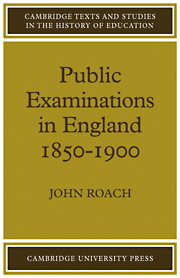Book contents
- Frontmatter
- Contents
- Dedication
- Preface
- List of abbreviations
- PART I THE COMPETITIVE PRINCIPLE ESTABLISHED
- PART II THE OXFORD AND CAMBRIDGE LOCALS AND NATIONAL EDUCATION, 1857–1900
- 4 Beginnings, 1857–1860
- 5 The education of women
- 6 Secondary schools and their studies
- 7 The examiners and the examined
- PART III THE PUBLIC CONTEXT, 1855–1900
- Bibliography
- Index
7 - The examiners and the examined
Published online by Cambridge University Press: 07 October 2011
- Frontmatter
- Contents
- Dedication
- Preface
- List of abbreviations
- PART I THE COMPETITIVE PRINCIPLE ESTABLISHED
- PART II THE OXFORD AND CAMBRIDGE LOCALS AND NATIONAL EDUCATION, 1857–1900
- 4 Beginnings, 1857–1860
- 5 The education of women
- 6 Secondary schools and their studies
- 7 The examiners and the examined
- PART III THE PUBLIC CONTEXT, 1855–1900
- Bibliography
- Index
Summary
At the end of the seventies, when both the Delegacy and the Syndicate came of age, they were undertaking important new responsibilities through the growth of extension lectures to adults. The pioneer had been a young fellow of Trinity College, Cambridge, James Stuart, who gave a series of lectures to mixed audiences in northern towns in 1867. In 1873 the University of Cambridge gave the work official recognition and a syndicate with Stuart as secretary was set up to manage it. When he resigned in 1875, he was succeeded by G. F. Browne, secretary of the Local Examinations Syndicate. It was natural at the time that both lectures and examinations should be regarded as part of the ‘extension’ work of the university, and in May 1878 the Local Examinations Syndicate voted in favour of a recommendation that the two syndicates for lectures and for examinations should be united. A Grace passed the Senate in June of the same year, and Browne became secretary of the United Syndicate. At Oxford events took a different course. Oxford had been slower than Cambridge in entering the field of extension lecturing, and there the Local Examinations machinery was used from the first. In December 1877 the Delegacy agreed at the request of the Hebdomadal Council, to undertake the work of lecturing and teaching in the large towns, and on 29 May 1878 A. H. D. Acland, son of the joint founder of the Locals, was appointed secretary for lectures. His successor chosen in 1885, was M. E. Sadler (Sir Michael Sadler), later a prominent authority on the history and organization of education.
- Type
- Chapter
- Information
- Public Examinations in England 1850–1900 , pp. 164 - 188Publisher: Cambridge University PressPrint publication year: 1971



